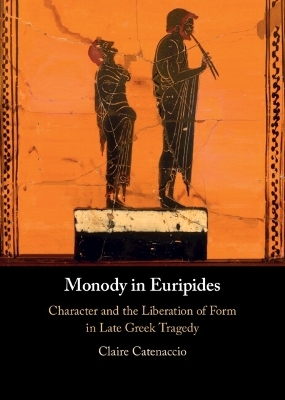
Monody in Euripides
Character and the Liberation of Form in Late Greek Tragedy
Seiten
2023
Cambridge University Press (Verlag)
978-1-009-30012-4 (ISBN)
Cambridge University Press (Verlag)
978-1-009-30012-4 (ISBN)
Reveals Euripides' ground-breaking use of monody, or solo actor's song, in his late tragedies. Contributing to the current scholarly debate on music, emotion, and characterization in Greek drama, Claire Catenaccio examines the role of monody in the musical design of Ion, Iphigenia among the Taurians, Phoenician Women, and Orestes.
The solo singer takes center stage in Euripides' late tragedies. Solo song – what the Ancient Greeks called monody – is a true dramatic innovation, combining and transcending the traditional poetic forms of Greek tragedy. At the same time, Euripides uses solo song to explore the realm of the interior and the personal in an expanded expressive range. Contributing to the current scholarly debate on music, emotion, and characterization in Greek drama, this book presents a new vision for the role of monody in the musical design of Ion, Iphigenia among the Taurians, Phoenician Women, and Orestes. Drawing on her practical experience in the theater, Catenaccio establishes the central importance of monody in Euripides' art.
The solo singer takes center stage in Euripides' late tragedies. Solo song – what the Ancient Greeks called monody – is a true dramatic innovation, combining and transcending the traditional poetic forms of Greek tragedy. At the same time, Euripides uses solo song to explore the realm of the interior and the personal in an expanded expressive range. Contributing to the current scholarly debate on music, emotion, and characterization in Greek drama, this book presents a new vision for the role of monody in the musical design of Ion, Iphigenia among the Taurians, Phoenician Women, and Orestes. Drawing on her practical experience in the theater, Catenaccio establishes the central importance of monody in Euripides' art.
CLAIRE CATENACCIO is a scholar of Ancient Greek literature and its modern reception. As a dramaturge and director, she has worked extensively with contemporary productions of ancient plays. She is a member of the faculty of Classics at Georgetown University.
Introduction: the song at work; 1. Ion: Monody as Agōn; 2. Iphigenia among the Taurians: memory and movement; 3. Phoenician women: the lyric voice of a shattered house; 4. Orestes: monody as messenger speech; Conclusion: freedom and form.
| Erscheinungsdatum | 01.08.2023 |
|---|---|
| Zusatzinfo | Worked examples or Exercises |
| Verlagsort | Cambridge |
| Sprache | englisch |
| Themenwelt | Literatur ► Klassiker / Moderne Klassiker |
| Literatur ► Lyrik / Dramatik ► Dramatik / Theater | |
| Geschichte ► Allgemeine Geschichte ► Altertum / Antike | |
| Geisteswissenschaften ► Sprach- / Literaturwissenschaft ► Anglistik / Amerikanistik | |
| Geisteswissenschaften ► Sprach- / Literaturwissenschaft ► Literaturwissenschaft | |
| ISBN-10 | 1-009-30012-1 / 1009300121 |
| ISBN-13 | 978-1-009-30012-4 / 9781009300124 |
| Zustand | Neuware |
| Haben Sie eine Frage zum Produkt? |
Mehr entdecken
aus dem Bereich
aus dem Bereich
Die unglaubliche Geschichte eines antiken Söldnerheeres
Buch | Hardcover (2022)
C.H.Beck (Verlag)
28,00 €
die Inszenierung der Politik in der römischen Republik
Buch | Hardcover (2023)
C.H.Beck (Verlag)
48,00 €


